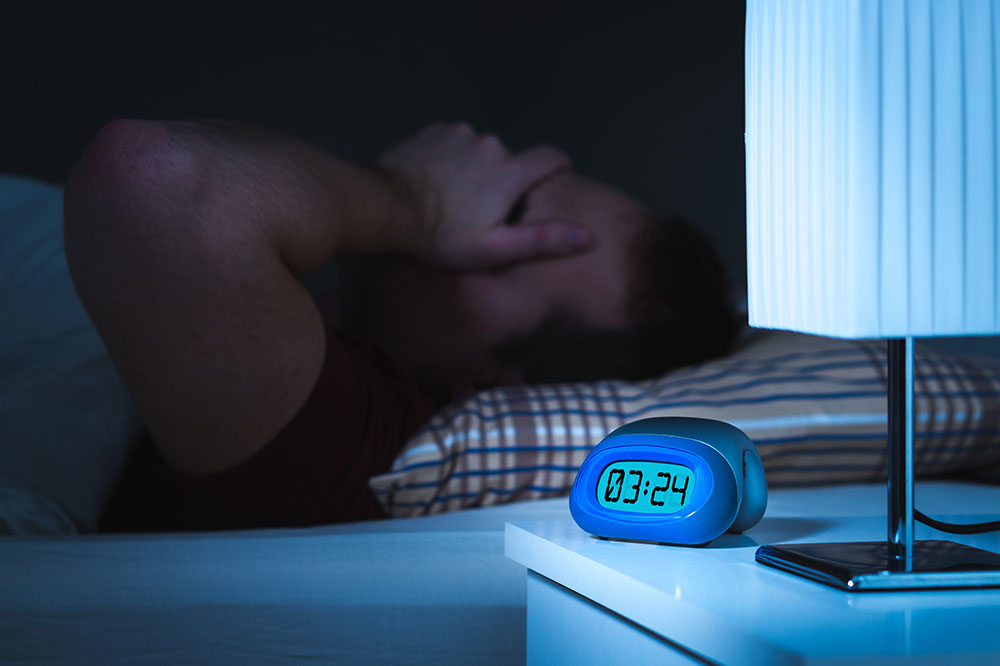The Cycle Between Sleep Apnea & Obesity
Excess weight can increase your risk of developing obstructive sleep apnea (OSA) — a serious sleep disorder that can interfere with your body’s ability to breathe during the night. This can make getting a good night’s sleep difficult. That’s why it’s important to lose excess weight to help reduce your symptoms, as sleep apnea can lead to obesity and take a toll on your overall health.
Weight gain is one of the most common symptoms of sleep apnea, and can lead to patients getting stuck in a frustrating cycle that’s difficult to escape without intervention from experts like Dr. Winkelmann. If not treated, this can lead to further complications including cardiovascular disease, type 2 diabetes, and hypertension.
In a 2011 study conducted by the International Journal of Obesity, it determined that sleeping troubles often lead to weight gain. This conclusion was also backed up in a 2013 study from the National Academy of Sciences.


The Benefits of Weight Loss
The most effective way to reduce your sleep apnea symptoms is through weight loss. Researchers from a 2009 study observed that, “intensive lifestyle intervention will result in significant and clinically relevant improvements in OSA.” This includes the addition of a weight loss program and portion-controlled diet.
Losing weight can also reduce your risk of further complications associated with sleep apnea, including heart disease, high blood pressure, and low metabolism. Both Dr. Winkelman and the American College of Physicians agree that weight loss is the number one treatment option for sleep apnea.
Finding Enjoyable Exercise
Regular exercise is important for maintaining a healthy lifestyle, but can be challenging and awkward when first starting out. Without proper guidance, it can be difficult to stay active, even when you’re not trying to lose weight. Nonetheless, exercise is necessary to improve your quality of life — it gives you energy, confidence, and a better night’s sleep.
The good news is that to lose weight, you don’t have to follow a specific regimen. The best results Dr. Winkelmann has witnessed are from patients who lose weight by doing activities they enjoy. This is often due to the fact that it’s easier to maintain a workout you love doing, which can further increase your motivation.
Dr. Winkelmann recommends selecting interest-based activities or exercises. For example, if you love the beach, try taking a 15-minute stroll while you’re there. If sports interest you, sign up for a program at your local community center.

Having a Well-Balanced Diet

Exercising is only half the equation of weight loss. Along with an active regimen, it’s also important to maintain a balanced diet. While patients are intimidated by the idea of shifting their eating habits, you actually don’t have to do anything extreme to see results. In a 2011 study, researchers found that a Mediterranean diet can improve your sleep apnea symptoms.
The Mediterranean diet has also proven to be good for heart health, reducing your risk of Parkinson’s, cancer, and Alzheimer’s. Best of all, it includes many of the foods we love without having to give up meat or carbs in the process.
Dieting doesn’t mean giving up the foods you love. It’s more important to limit the number of calories you consume on a daily basis and exercise than it is to “eat healthy.” Most importantly, defining clear achievable goals for yourself can make you feel motivated.
Frequently Asked Questions
Will losing weight help cure my sleep apnea?
Unfortunately, sleep apnea can’t be cured, but losing weight can help dramatically improve whatever symptoms you’re experiencing. By reducing the amount of fatty tissue that’s around your neck, you’ll decrease the amount of pressure required to support your airway support. As long as you undergo professional treatment, you can achieve peaceful sleep.
Does treating sleep apnea help with losing excess weight?
Getting quality rest by treating your sleep apnea can improve your metabolism and help maximize your weight loss efforts. The stable flow of oxygen your body receives throughout the night will also make you feel rested and energized when waking up. That means you won’t be at a disadvantage in your daily efforts to make healthy and meaningful lifestyle choices.
Can sleep apnea worsen insulin resistance caused by obesity?
Certain conditions like intermittent hypoxia and sleep fragmentation, which can result in a chronic low-grade inflammatory state, are associated with sleep apnea. This inflammation can lead to insulin resistance and other metabolic dysfunctions. Individuals with abdominal obesity are particularly at risk, as fat deposits in the abdominal area can quicken this process.
Does positional therapy help sleep apnea symptoms?
Yes! Practicing positional therapy has been found to be effective in reducing sleep apnea symptoms in some individuals with central obesity. Sleeping on one’s side can help prevent the collapse of the upper airway during sleep, reducing the frequency and severity of apneic events. However, this approach may not be effective for everyone. Your sleep specialist will need to conduct an evaluation to determine the best treatment plan for your specific needs.
Change Your Sleep & Lifestyle With Dr. Winkelmann
If you’re struggling with sleep apnea and are overweight, get the professional care you need to improve your sleep and your health. At The CPAP Alternative, Dr. Winkelmann can help you get your weight under control with lifestyle changes that reduce sleep apnea symptoms. To schedule an appointment, contact our Wake Forest, NC practice by calling (984) 237-1013 or by filling out an online contact form. We warmly welcome patients living in Wake Forest and surrounding areas such as Riverstone, Staffordshire, and Brooke Hollow, NC.
